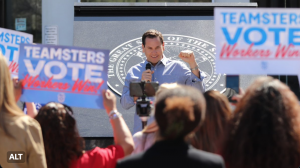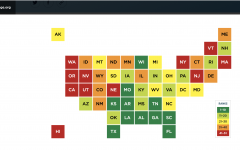
NV SOS Francisco Aguilar (Photo: CIsco for Nevada)
‘Speedy’ Implementation of New Top-Down Election System In Nevada Threatens Election Integrity
Multiple sources fear ‘The (VREMS) system is not going to work’
By Megan Barth, March 7, 2024 3:05 pm
Multiple sources near and within the Secretary of State’s office are worried about the “speedy” implementation of the top-down election system (VREMS) and are raising numerous and serious concerns that the integrity of the primary and presidential election may be negatively impacted.
At the very worst, sources fear “the system is not going to work” and “most counties do not trust what is being done by the State.”
According to the SOS office, a $30 million allocation approved during the last legislative session will “fund the speedy implementation of the Voter Registration and Elections Management Solution (VREMS to create a centralized statewide voter registration database.” (emphasis added)
This system, prescribed by Assembly Bill 422 which was passed in the 2021 legislature, “will make our elections more consistent across all 17 counties and increase transparency in voter data,” Secretary of State Cisco Aguilar announced.

Yet, numerous sources have told The Globe that a majority of county registrars and clerks say that the speedy timeline for the implementation of the new VREMS system is “asinine” and “ridiculous.”
“The urgency that the state is feeling is not the urgency the counties are feeling. The State’s urgency is politically driven,” a source told The Globe. “We want this, but we want it done right.”
According to one source, “This is the most horrendous thing I have been through. The right thing to do is to push VREMS implementation to 2025, after the presidential election in November.”
Although sources confirm that a majority of counties are “thrilled with the idea” of the new system, election officials in other states who have implemented the VREMS system, like Wisconsin, say it takes two to three years to implement, not the eight month timeline that Secretary Aguilar has set.
“We are at the mercy of reading manuals and are hoping we don’t miss something,” a source told The Globe. “The room for errors increases significantly across the state and at the county level because this is all brand new. How are we to learn a brand new system on the fly in a presidential election year?
The validation of the VREMS system has also heightened their concerns as the State will only run one mock election to test the new system. The mock election will be held this Monday and Tuesday, March 11 and 12. The original validation plan did not include mail-in ballots until their was wide-spread pushback last week from the counties to include universal mail balloting.
With the mock election this Monday and Tuesday, and final implementation of VREMS set for April 1, the counties will only have six weeks to prepare before early voting begins for the June primary. They will have only one week to pull data for their vendors to create sample and election ballots and to vet who receives sample and mail ballots.
Additionally, the sources note that the project managers of the implementation do not have election experience which has caused additional work for the counties at a time when they are processing property taxes, candidate filings, and general business in their respective communities.
“A majority of counties are not prepared because we haven’t been in the system to test current data. The project managers can’t answer our specific questions related to elections. The people that the Secretary of State has hired know nothing about elections,” a source warned.
“The frustration level is very high. We can’t catch a break. The stress level is also high and many of us are having health problems, yet we have no time to recuperate. County election officials are worried. This new top-down system has to function at 100 percent. This is imperative. You can’t have one percent of inaccuracy in an election,” the source added.
“A majority of counties are going to use a dual system because we are worried. We want a check and balance. But, the SOS doesn’t want that because they don’t wants us to find mistakes,” another source told The Globe.

These concerns exclusively given to The Globe follow the “glitch” in the Presidential Preference Primary (PPP) which provoked public backlash over President’s Day weekend and an emergency meeting between the counties and the SOS at 8 am on February 19th, a state holiday.
When a source was asked about the PPP glitch, the source fired back, “The SOS threw the clerks under the bus. Yet, without one of the county clerks figuring out what happened, over a holiday weekend, who would have figured it out? The clerks are elected officials and the SOS has decided he wants to take control away from these elected election officials and centralize any and all power within his office,” adding, “Aguilar just passed new election regulations without county input. For example, our contingency plans for elections, in case something goes wrong, now has to be approved by his office. Our contingency plans didn’t need approval by the SOS in the past.”
After the glitch, Secretary of State Aguilar issued an apology, blamed a technical error, and noted that “Nevada has a long history of secure, fair, and accessible elections…Voters should have absolute confidence in the entire election process.”
In order to provide transparency to Nevada’s elections, the RNC and the Nevada GOP filed three separate public records requests this week for related information, including internal/external communications of the Secretary of State’s office, in relation to the glitchy primary.
The Globe will continue to follow the validation of the VREMS system and its speedy implementation.
- Illegal Alien Identified As Wrong-Way Driver in Fatal Crash That Killed LVMPD Officer - December 23, 2024
- Senator Rosen Joins Letter Raising Concerns About Pete Hegseth’s Nomination - December 20, 2024
- NV SOS Launches Four Investigations Into 2024 Election Violations - December 20, 2024





The Legislature and the SOS office was warned last year that there is a perception problem with our voting system in Nevada. Even if the system is 100% secure as the SOS’s office professes, the people don’t believe it. Perception is Reality! I suggested to the Legislative committee to at least look and pass some legislation to tweak the system in a way to improve confidence if they didn’t want to pass a comprehensive bill. “Crickets” By not even hearing the Governor’s bill and by not improving processes to strengthen the integrity of mailed ballots, they have set themselves up for unnecessary criticism. I don’t think anyone is nefarious in setting up a system to encourage fraud, so I would strongly encourage the SOS’s office to communicate why the system is secure and that every vote cast and counted will be from the person legally registered to vote. In 2024, at a minimum, we should run parallel systems but use the existing system as the system of record. I’ve been involved with too many system implementations that completely failed on rollout. An election is too important to trust to a contractor and especially one being driven to an expedited schedule.